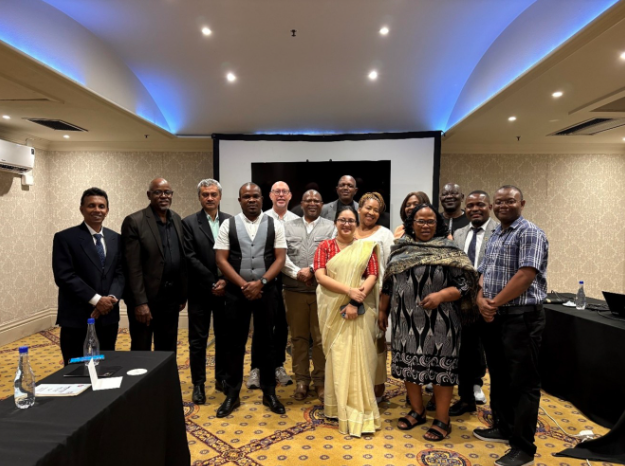
By Dr Tony Mays
Director: Education COL
COL hosted a pre-conference workshop on open schooling on the day before PCF11 in Gaborone, Botswana. The workshop focused on three of the themes which had emerged from the publication of Open Schooling in a Digital Era : enhanced inclusion, better business models and vocationalisation of the curriculum.
Thirteen delegates from twelve countries participated in the workshop, which was facilitated by COL’s Director: Education, Dr Tony Mays. He noted that while most countries face challenges in the transition from primary to secondary level schooling in particular, only 23 of 56 Commonwealth countries seem to have a formal system to try to address this, with two other countries currently working on a strategy.
Presentations were made by:
- Mizanoor Rahman, from Bangladesh Open University, on Inclusivity
- Heroldt Murangi, a consultant from Namibia, on Business Models
- Umang Chauhan, from National Institute of Open Schooling, India, on vocationalisation.
After the presentations, teams discussed the three key themes.
Team 1 explored how the Inclusivity issues identified might be operationalised in a country like Malawi.
Participants noted that there was need for both policy and structured implementation plans to improve inclusion in provision. A recent exercise supported by COL to improve access and retention for girls using a community-based mentoring was referenced as a successful approach that had impacted Malawi College of Distance Education (MCDE) learning support strategies more widely. An important aspect of this is advocacy – to address gaps and increased student engagement with non-formal education as a pathway back into formal education. When it comes to understanding Inclusive Education more broadly, it is not just about addressing the needs of students with disabilities but also supporting the needs of minorities– recognising cultural diversity, offering monetary incentives for those from financially deprived households, understanding the needs of the gifted, improving life chances for girls and women, supporting the transgender community, and engaging with the rehabilitation of prisoners, among other sub-populations.
Team 2 examined Business Models and noted the wide rage of levels of readiness to engage with such issues.
They discussed a need for curriculum and business model guidelines which can be customised for different context—suggesting curriculum and related business model should focus on the needs of learners and help them develop relevant skills for employment and self-employment, and the ability to make a contribution to socio-economic development. It was also noted that introducing a new business model is likely a three- to five year process as partners build towards scale and planning should take into account the need for an incremental approach that aligns with fiscal cycles. Providers could explore options such as public-private partnerships and inter-country partnerships sharing models, tools and courses.
Team 3 looked into the vocationalisation of the open schooling curriculum.
It was noted that more countries are exploring vocationalising of both the open schooling and Open TVET curriculum to create learning pathways from one to the other. There is need to address issues at two levels of provision – pre-vocational offerings at the basic education level and vocational offerings at the post-schooling level, which will likely require engagement with two or more Ministries. There is a need generally for bridging courses between different levels of engagement and for robust engagement with issues of certification and recognition, probably through recognition of micro-credentials which can be aggregated up to macro-credentials.
To enable the discussion to continue post workshop, all workshop delegations agreed to share emails and to form a WhatsApp group. COL was already supporting or engaging directly in open schooling through one or more of its initiatives, with the countries represented in the workshop, #col4d, @col#Bangladesh, #Botswana, #Eswatini, #The Gambia, #India, #Lesotho, #Malawi, #Mozambiqie, #Namibia, #Sri Lanka, #Tanzania, #zambia.
Follow Dr Tony Mays on LinkedIn to keep up to date with COL’s work in open and distant education across the Commonwealth.


